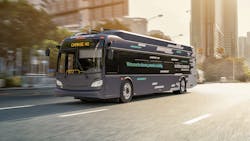New Flyer introduces Xcelsior CHARGE NG™
New Flyer of America Inc., a subsidiary of NFI Group Inc., unveiled its Xcelsior CHARGE NG™, the newest iteration of its Xcelsior platform that was originally introduced in 2009.
New Flyer says it “applied the best of zero-emission design, performance, research and ingenuity” in the development of battery-electric Xcelsior CHARGE NG™.
“The Xcelsior CHARGE NG harnesses the best technology on the market. It includes a streamlined design that reduces maintenance, increases energy density and improves energy recovery while significantly reducing weight – offering a lighter, more energy efficient and longer-range electric bus,” said Chris Stoddart, president, New Flyer and MCI. “As EV demand continues to build, so too has our innovation. With better manufacturability, higher energy recovery, fewer parts and improved system durability, our Xcelsior CHARGE NG is a high-performance bus that is more sustainable and easier to maintain.”
The Xcelsior CHARGE NG will be available in 35-foot, 40-foot and 60-foot models with total passenger capacity of up to 88. The bus is capable of on-route charging or plug-in charging.
New Flyer explains the new bus has a trio of notable advancements, including a new generation of batteries that extend range up to 13 percent. The batteries utilize an active liquid cooling system to maintain temperature and are also better insulated, lending optimal temperature maintenance, prolonged battery life and greater power efficiency.
The new generation of batteries are housed in packaging developed by New Flyer to be lighter weight and easier to maintain. New Flyer has reduced the number of service parts from 250 to 50, which is a 90 percent reduction. The battery enclosure is also waterproof and protected from dust intrusion.
The third advancement is the inclusion of the Siemens ELFA 3 traction system, which New Flyer says delivers up to 90 percent energy recovery and weighs 69 percent less than ELFA 2, allowing greater passenger capacity and lending more efficient design through compact inverters and embedded drive controllers.
“Millions of people count on us every day, whether for reaching their destinations or expecting the highest quality from our technology,” said Jennifer McNeill, vice president of Public Sector Sales and Marketing. “This is why, alongside vehicle technology advancements, we have evolved our manufacturing and field services processes to ensure a safe, reliable, scalable approach to be ready for tomorrow’s growing electric bus demand today. In turn, we also enhanced training for our teams and those of transit agencies across North America; enabling EV adoption while supporting continuous workforce development to drive the new mobility era.”
New Flyer will host a no cost virtual training session on May 26, 2021, through the Vehicle Innovation Center (VIC) on the new bus. To register for the VIC session, visit newflyer.com/NG.
This is the third product launch for NFI Group since late January 2021 and follows the release of the group’s first fully operational heavy-duty automated transit bus, the Xcelsior AV™, and the launch of the Equess CHARGE™ from ARBOC Specialty Vehicles.
About the Author

Mischa Wanek-Libman
Group Editorial Director
Mischa Wanek-Libman is director of communications with Transdev North America. She has more than 20 years of experience working in the transportation industry covering construction projects, engineering challenges, transit and rail operations and best practices.
Wanek-Libman has held top editorial positions at freight rail and public transportation business-to-business publications including as editor-in-chief and editorial director of Mass Transit from 2018-2024. She has been recognized for editorial excellence through her individual work, as well as for collaborative content.
She is an active member of the American Public Transportation Association's Marketing and Communications Committee and served 14 years as a Board Observer on the National Railroad Construction and Maintenance Association (NRC) Board of Directors.
She is a graduate of Drake University in Des Moines, Iowa, where she earned a Bachelor of Arts degree in Journalism and Mass Communication.
